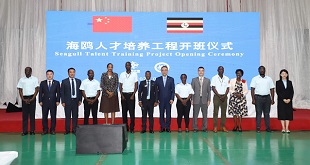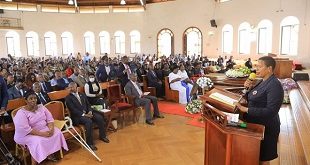
Peace Winds, JICA lead in provision of water, sanitation, nutrition
Kampala, Uganda | IAN KATUSIIME | Tereza Inna, 80, watched anxiously as a group of visitors approached her tent. She is one of the estimated 270,000 South Sudanese refugees forging a new life in Bidi Bidi refugee settlement in Yumbe district in the West Nile sub region of Uganda.
The visitors included officials of United Nations High Commission for Refugees (UNHCR), the Japanese International Cooperation Agency (JICA), and staff of Peace Winds, a Japanese NGO that has put up a water system and latrines in Zone 3 of Bidi Bidi refugee settlement. The group was visiting Inna because she is in a category of refugees classified as Special Needs Persons (SNPs), whom Peace Winds is helping.
Her advanced age puts her in this category and so is one of her grandchildren whom she says has a constant ache in one of the limbs. Inna who speaks through a translator says she is grateful to Peace Winds.
“These people are helping me a lot. I no longer have to suffer the burden of getting water, or go hide somewhere to use a latrine,” she says as her five grandchildren look on.
She describes how she was Yei in South Sudan when the father of the five children was killed in the civil war that erupted when forces loyal to President Salva Kiir attacked those of then-vice president Riek Machar.
“The children’s mother was trapped there,” says Inna, “so here I am.” Inna says she has found a new home.
A few meters from Inna’s household is that of 75-year-old Enita Moriba, another SNP. She shows off her new latrine just next to her shelter. With more resources coming in, Peace Winds plans to construct semi-permanent houses in the settlement.
Innocent Nyero, a project officer with Peace Winds says there are about 18,000 SNPs in Zone 3 alone which houses 65,000 refugees. He says the organisation has put up 600 latrines in the settlement. Under a project named Water, Sanitation, and Hygiene (WASH), Peace Winds has installed a system of water tanks to ease access, especially for the SNPs. The WASH project started in December 2016 when many refugees streamed in from South Sudan.
Previously, Bidi Bidi relied on a water trucking system which various aid officials in the settlement said was very expensive. Each day, trucks would drive in and supply water and UNHCR workers said it was not sustainable.
Under the sanitation project, a solar powered borehole has been unveiled to cater for two villages in Zone 3 of Bidi Bidi. Acacio Jaffar, the Head of the Field Office for UNHCR in Yumbe said the borehole would ensure Bidi Bidi moves from emergency to sustainable solutions.
The borehole was commissioned by the Japanese Ambassador to Uganda Kazuaki Kameda who explained that sanitation is very important in a refugee settlement.
“Water trucking has been costly and we hope it will be used sustainably,” he said.
Rice for refugees
Meanwhile, JICA is promoting a new variety of rice, Nerica 4, which it encourages refugees and farmers in the West Nile region to grow.
Teaming up with Abi Zonal Agricultural and Research Development Institute (ABI ZARDI) in Arua District, JICA is giving out 1kilogramme of rice seeds per person to smallholder farmers and refugees. Kassim Sadiq, the Director of ABI ZARDI says there is a deliberate move to ensure that the increasing number of refugees in the region benefit from the project. Sadiq says the decision has empowered both the host community and refugees because of the unique ability of rice to multiply after planting.
With the popularity of Nerica 4 among farmers and its high yields, Sadiq says the Promotion of Rice Development (PRIDE) project in the region has a bright future. Over 2000kilogrammes of the rice variety were handed out in 2015.
“It would be a good thing if the refugee community can produce surplus rice since it is an internationally traded crop,” he says.
At a model farm in Adjumani district under the PRIDE project, Sam Lagu described his new found success after 17 years of growing rice. When he joined the project in 2014, he was given 1kilogramme of NERICA 4 rice and in the next season in 2015 he was harvesting 1200 kilogrammes of rice. Lagu gave 5 acres to a group of refugees who are now reaping the rewards. Although the drought in 2016 caused some setbacks, he says growing Nerica 4 rice has been an unforgettable experience. The only major challenge for the farmers appears to be the limited application of fertilisers on their rice farms.
With adaptive research being done on Nerica 4, farmer trainings being conducted, and other incentives, the project has managed to attract a number of millers. At the model farm, Ambassador Kameda lauded Uganda’s policy on refugees which grants them free movement and the privilege to do business.
District leaders in West Nile said, however, that emergency refugee response should rightly be a responsibility of the central government and strains the local administration. They cited the complexity of implementing contingency plans whenever there is an influx of refugees.
****
 The Independent Uganda: You get the Truth we Pay the Price
The Independent Uganda: You get the Truth we Pay the Price


